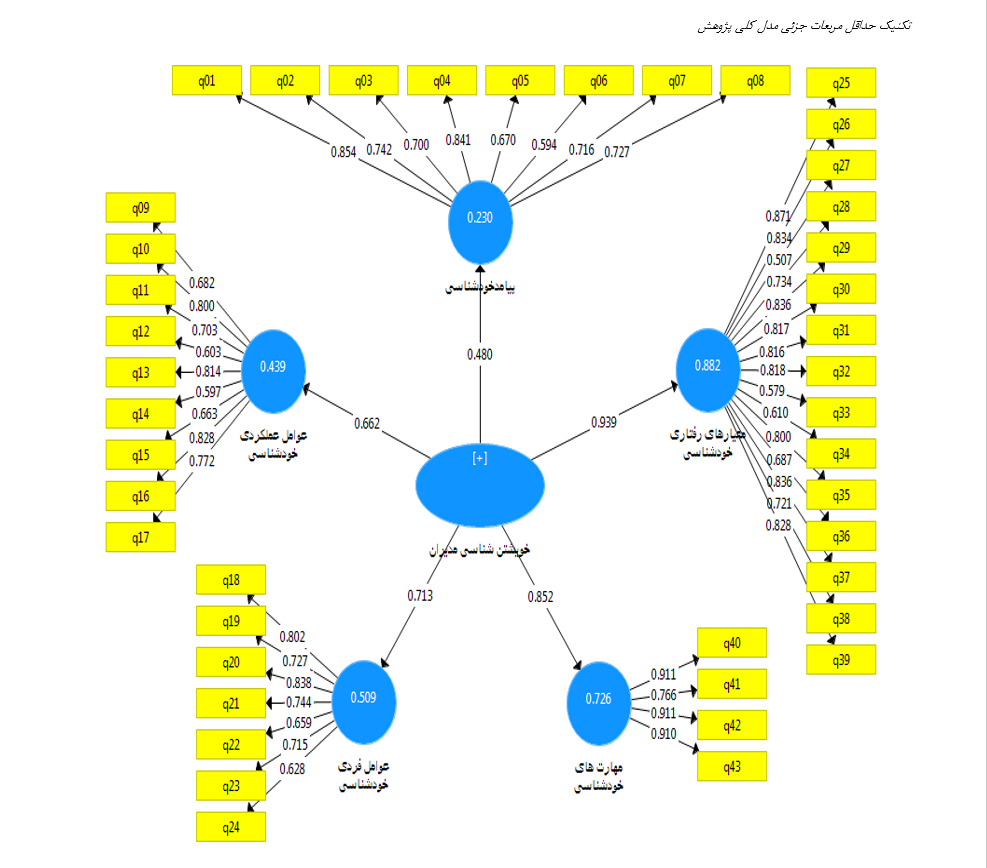Validation of the Self-Concept Model of Managers of Iranian Government Organizations
Keywords:
Self-knowledge, self-knowledge of managers, behavior of managersAbstract
The aim of this research is to present and validate the self-concept model of managers of Iranian government organizations. This study was conducted using a descriptive-survey method with a mixed (qualitative-quantitative) approach. In the qualitative section, the initial model was extracted and developed through the analysis of specialized interviews with management experts. In the quantitative section, the statistical population included senior, middle, and operational managers of Iranian government organizations. Using stratified random sampling based on Cochran's formula, 384 individuals were selected as the sample. The data collection tool was a standard questionnaire, the validity and reliability of which were assessed. Data analysis was performed using Smart PLS software. The results indicated that the functional, individual, and behavioral factors of self-concept, along with their skills and outcomes, significantly affect managers' self-concept. The findings of this research can greatly assist managers and organizations in enhancing managerial skills and increasing organizational performance effectiveness.
Downloads
References
Carden, J., Jones, R. J., & Passmore, J. (2022). Defining Self-Awareness in the Context of Adult Development: A Systematic Literature Review. Journal of Management Education, 46(1), 140-177. https://doi.org/10.1177/1052562921990065
Dummel, S., & Stahl, J. (2019). Mindfulness and the Evaluative Organization of Self-Knowledge. Mindfulness, 10, 352-365. https://doi.org/10.1007/s12671-018-0980-6
Hamidi, A., Faghihi, A., & Teimoornezhad, K. (2024). Identifying and Ranking Factors Affecting Policymaking of Public Administrators' Education. Public Management Researches, 16(62), 63-96. https://doi.org/10.22111/jmr.2022.42740.5807
Lawrence, E., Dunn, M. W., & Weisfeld-Spolter, S. (2018). Developing leadership potential in graduate students with assessment, self-awareness, reflection and coaching. Journal of Management Development, 37(8), 634-651. https://doi.org/10.1108/JMD-11-2017-0390
McConnell, A. R., Dunn, E. W., Austin, S. N., & Rawn, C. D. (2011). Blind spots in the search for happiness: Implicit attitudes and nonverbal leakage predict affective forecasting errors. Journal of Experimental Social Psychology, 47, 628-634. https://doi.org/10.1016/j.jesp.2010.12.018
Morin, A. (2006). Levels of consciousness and self-awareness: A comparison and integration of various neurocognitive views. Consciousness and Cognition, 15(2), 358-371. https://doi.org/10.1016/j.concog.2005.09.006
Neumann, O., Guirguis, K., & Steiner, R. (2024). Exploring artificial intelligence adoption in public organizations: a comparative case study. Public Management Review, 26(1), 114-141. https://doi.org/10.1080/14719037.2022.2048685
Oliinyk, M. (2024). Digital Transformation of Management Processes in State and Public Organizations: Features, Directions, and Recommendations for Development. Management and Entrepreneurship Trends of Development, 1(27), 53-63. https://doi.org/10.26661/2522-1566/2024-1/27-05
Segal, L., & Lehrer, M. (2012). The Institutionalization of Stewardship: theory, propositions, and Insights from Change in the Edmonton Public Schools. Organization Studies, 33(2), 169-201. https://doi.org/10.1177/0170840611433994
Showers, C. J. (1992). Compartmentalization of positive and negative self-knowledge: Keeping bad apples out of the bunch. Journal of personality and social psychology, 62(6), 1036-1040. https://doi.org/10.1037/0022-3514.62.6.1036
Showers, C. J., Abramson, L. Y., & Hogan, M. E. (1998). The dynamic self: How the content and structure of the self-concept change with mood. Journal of personality and social psychology, 75(2), 478-493. https://doi.org/10.1037/0022-3514.75.2.478
Showers, C. J., Ditzfeld, C. P., & Zeigler-Hill, V. (2015). Self-concept structure and the quality of self-knowledge. Journal of personality, 83(5), 535-551. https://doi.org/10.1111/jopy.12130
Showers, C. J., & Kling, K. C. (1996). Organization of self-knowledge: Implications for recovery from sad mood. Journal of personality and social psychology, 70(3), 578-590. https://doi.org/10.1037/0022-3514.70.3.578
Sutton, A. (2016). Measuring the effects of self-awareness: Construction of the Self-Awareness Outcomes Questionnaire. Europe's journal of psychology, 12(4), 645-658. https://doi.org/10.5964/ejop.v12i4.1178
Valle, M. (1999). Crisis, Culture and Charisma: The New Leader's Work in Public Organizations. Public Personnel Management, 28(2), 245-257. https://doi.org/10.1177/009102609902800206

Downloads
Published
Submitted
Revised
Accepted
Issue
Section
License
Copyright (c) 2025 Amid Deilami Moezzi (Author); Mehran Mokhtari Bayekolaei; Davood Kia Kojouri (Author)

This work is licensed under a Creative Commons Attribution-NonCommercial 4.0 International License.










